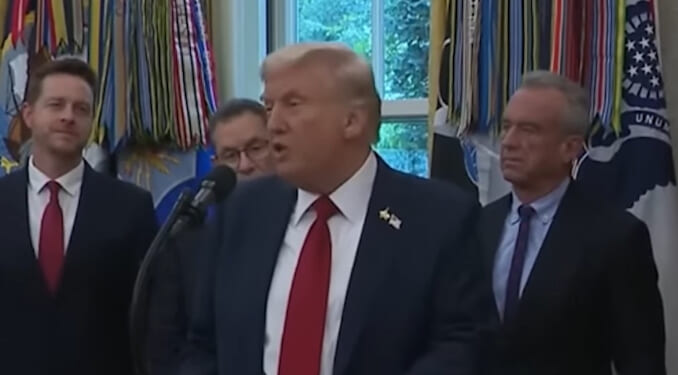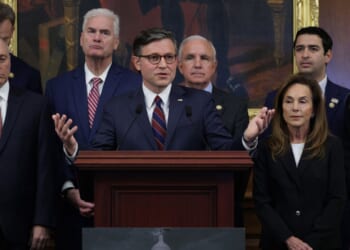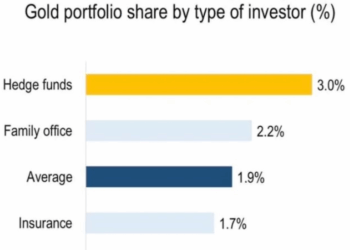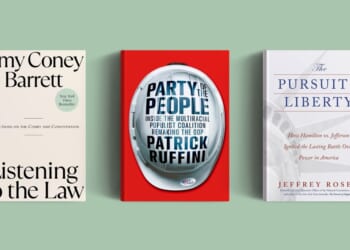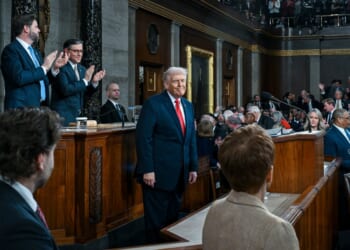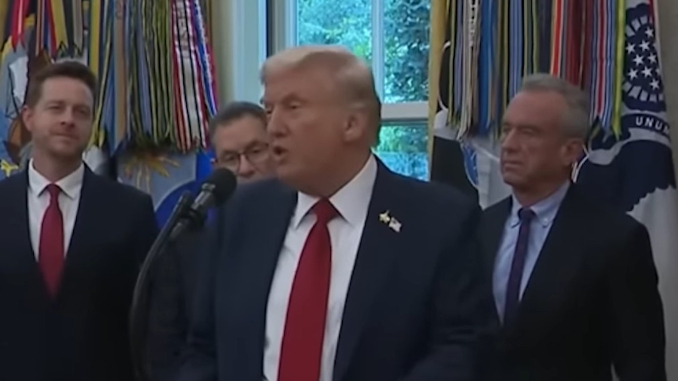
By Nick Griffin
Just how good a deal for ordinary citizens is President Donald Trump’s drug pricing agreement with Pharma giant Pfizer?
Click the Link Below to Listen to the Audio of this Article
Without a doubt, something very serious needs to be done about health care in the United States. Millions of Americans have the bitter experience of the sky-high cost of drugs and vital medical treatments. The eye-watering amounts you pay to the medical insurance sharks are incomprehensible to British observers.
So many MAGA patriots have welcomed Trump’s latest “deal.” His Oct. 2, 2025, handshake with Pfizer’s Albert Bourla sealed the “TrumpRx” plan to slash drug prices via a new website, and certainly grabbed the headlines.
Pfizer is promising deep discounts on drugs, with 30%–50% off on staples like Lipitor or insulin, sold straight to you through TrumpRx.com. For the 28 million Americans without insurance or stuck with brutal deductibles, this could mean saving $1,000 a year.
The agreement with the company to voluntarily lower U.S. drug prices also included Pfizer’s pledge to put an extra $70 billion into U.S. manufacturing and research.
In return, the company gets a three-year exemption from pharmaceutical-specific tariffs. Other drugmakers are now looking to strike similar agreements that would make them immune to the levies for most of Trump’s term.
Most other Big Pharma corporations have already unveiled new U.S. investments in manufacturing or research facilities to build goodwill with the president.
Under pressure from Trump’s tariff threat, Pfizer has agreed to sell its existing drugs to Medicaid patients at the lowest price offered in other developed nations, what Trump calls the most-favored-nation price.
Americans repeatedly shaken down for vital medication understandably tend to welcome the announcement. But, in truth, Medicaid pricing is already similar to international levels for most drugs.
Notably, Medicaid represents less than 5% of the company’s U.S. sales and an “even smaller percentage of global sales,” according to Leerink Partners analyst David Risinger.
Pfizer is certainly not a charity. It was central to Big Pharma’s world-robbing Covid scam, rushing out untested vaccines as the adverse reaction reports piled up and vax mandates stripped away basic freedoms. There again, the whole horror show wasn’t exactly the finest part of “The Donald’s” first term.
The continued drip-drip of revelations about heart problems, aggressive cancers and other health issues are a constant reminder that “safe and effective” was a propaganda slogan rather than science.
Partnering with one of the world’s worst Covid profiteers and opioid-pushers is like trying to deal with the devil. They get to dodge tariffs, but they’ll also harvest your health data through TrumpRx, feeding their marketing beast. And word is, this deal won’t touch the priciest new drugs.
As you know, it’s not just Pfizer. Big Pharma has been fleecing you since William Rockefeller moved on from selling snake oil. These price-gougers have got rich charging $500 for pills that cost pennies to make. Americans will only see lasting savings now if the president keeps coming back with more pressure. Big Pharma is one of the greediest and most dangerous of the giant lobby group—and it has its claws sunk into your elected officials.
Americans should praise Trump for making a start, but need to keep up the pressure for more, demanding the fine print on TrumpRx and pushing for real reforms like breaking Big Pharma’s patent stranglehold.
In as far as this deal is an improvement, the big lesson should be that it is possible to push even the most powerful lobbies for something which at least offers a semblance of fairness to ordinary folks. In the field of health, this especially means getting to grips with the health insurance racket. If Trump could impose a “deal” on these corporate extortionists, it really would be a big step forward.
Rep. Marjorie Taylor-Greene (R-Ga.) summed it up really well on “X” recently: “Americans are getting crushed by health insurance with monthly payments of $1,500, $1,700, and over $2,000 per month. … Health insurance is out of control.”
Understanding this, many Americans wonder if the British healthcare system is better, although—especially after the Obamacare debacle—there is an understandable fear of “socialized medicine.”
Well, the British NHS is expensive, but not as expensive as “your” system. At least all Brits get to use the health service which we all pay for, and it works very differently to the system in the United States. From what I hear, that works well for the rich and for people at the bottom of the social ladder—including those who are there because of their own bad life-choices—but it’s sucking middle America dry.
Does it add to British taxes and government debt? Undoubtedly. But U.S. gross government debt is 119.4% of GDP, while the UK figure is “only” 96.3%. The difference on per capita debt (total debt divided by population) is even more marked: $107,000 in the United States versus $45,000 in the UK. And none of us Brits gets bankrupted by medical bills.
When it was set up, Britain’s National Health Service (NHS) was intended to help people who fell sick or were injured to get back on their feet. It aimed to help the families of people who paid into the system, and to give them medical security in retirement. It was designed to provide good quality healthcare at cost, not through greedy middlemen and enriching giant corporations. It worked for a biblical lifetime.
It doesn’t work well now. Indeed, it has become unsustainable. But that is due to a combination of aging demographics, migrants pouring in who’ve never paid into the system, endemic obesity and idleness, increasingly advanced and expensive treatments, and the fact that the parts of it which can run at a profit have been privatized, leaving the costly bits for the taxpayer to fund.
If government took effective steps to deal with such challenges, then the British NHS system would still work well for British taxpayers and their families. That’s more than can be said for the hyper-capitalist monster that passes for healthcare in the States.
“You need a long spoon to sup with the Devil,” goes the fine old folk-saying. As U.S. president, Trump really has no choice but to sup from time to time with various devils. Big Pharma is definitely up there with the serious demons. Has he put them on a leash, or have they side-stepped his silver bullet? And will he build on what he has achieved so far?
Only time will tell, but my money says that Big Pharma will still be gouging Americans long after Donald Trump has become a major chapter in The Book of the United States.

